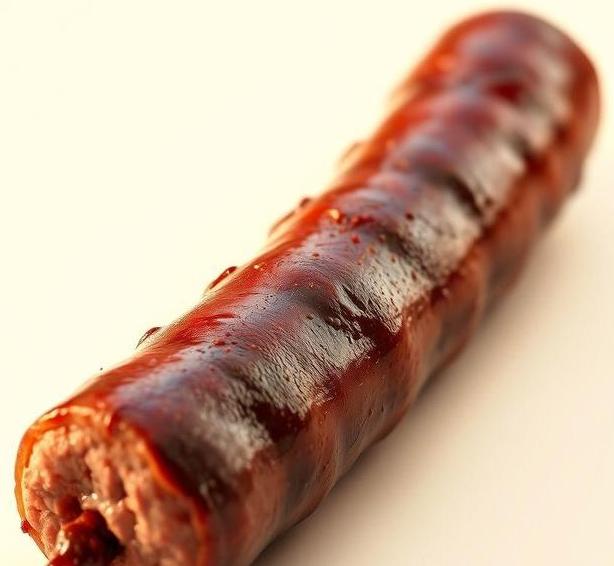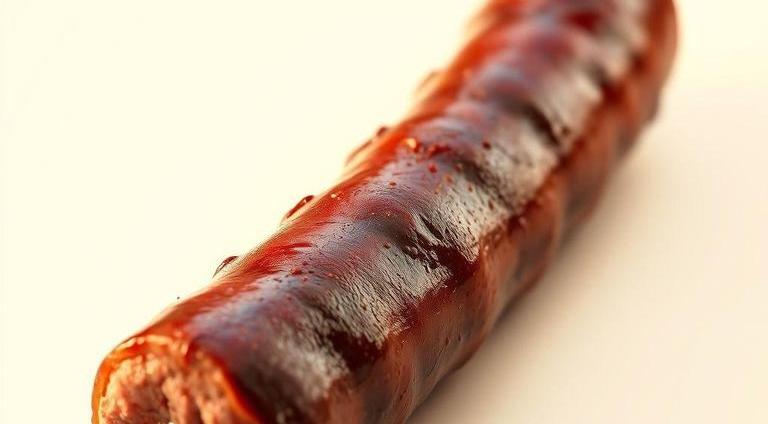Beef smoked sausage-rich, flavorful, and versatile-has become a staple in many kitchens. Whether it’s thrown on the grill, incorporated into soups, or sliced up for a snack, it’s a convenient and tasty choice for busy cooks. However, as with any meat product, it’s important to understand how to properly store and handle smoked sausage to ensure it stays fresh and safe to eat. We all know that sausages can be a bit tricky when it comes to their shelf life. The last thing you want is to bite into a sausage that’s gone bad and risk foodborne illness.
In this guide, we’ll walk through everything you need to know about beef smoked sausage-from understanding its shelf life to recognizing signs of spoilage, plus some storage tips to keep your sausages in peak condition. Let’s dive in and make sure your next sausage experience is a great one.
Can Beef Smoked Sausage Go Bad?
Yes, beef smoked sausage can absolutely go bad. While it’s smoked and often cured, which helps preserve it, it’s still a perishable product. The smoking and curing process generally make it more resistant to bacteria growth, but they don’t make it invincible. Over time, exposure to air, moisture, and improper storage can lead to spoilage.
The shelf life of smoked sausage is dependent on a variety of factors, including whether it’s been cooked, the type of casing used, and how it’s been stored. So, while a pack of beef smoked sausage might look perfectly fine at first glance, it’s crucial to monitor it closely for any signs that it has outlived its freshness.
Shelf Life For Beef Smoked Sausage

Knowing how long beef smoked sausage lasts can save you from a potential food safety issue. The shelf life depends on whether the sausage is cooked or uncooked, and whether it’s been opened or not. Here’s a quick breakdown:
-
Unopened, Raw Smoked Sausage (in The Fridge)
Typically, this lasts about 1 to 2 weeks past the "use by" or "sell by" date if properly stored in the refrigerator.
-
Opened, Raw Smoked Sausage (in The Fridge)
Once opened, it’s best to consume within 5 to 7 days to ensure optimal freshness and safety. Make sure it’s sealed tightly to minimize exposure to air.
-
Cooked Smoked Sausage (in The Fridge)
After cooking, beef smoked sausage can last about 3 to 4 days in the fridge. If you want to extend this, freezing is a good option.
-
Frozen Smoked Sausage (raw Or Cooked)
If you freeze your sausages, they can last a lot longer-typically around 6 to 9 months. However, the texture and flavor may start to degrade the longer it stays frozen, so it’s best to eat them sooner rather than later.
In general, the best way to ensure your sausage stays safe is to keep it tightly wrapped and in an airtight container, and to be mindful of expiration dates.
Common Signs Of Spoilage
Smoked sausages may look and smell fine at first glance, but there are several indicators that they’ve gone bad. It’s crucial to check them before you cook or eat them. Here are some common signs of spoilage to look out for:
-
Foul Or Sour Odor
One of the easiest and most reliable ways to tell if smoked sausage has gone bad is the smell. If it has a sour, rancid, or off-putting odor, it’s no longer safe to eat. This happens because bacteria and mold begin to break down the sausage over time, which produces unpleasant smells.
-
Slimy Or Sticky Texture
Smoked sausages should feel firm and dry on the outside. If you notice a slimy or sticky texture, that’s a sure sign of bacterial growth. The casing may feel tacky or wet to the touch, which indicates it’s been compromised.
-
Color Changes
If the sausage changes color-turning an unusual grayish, greenish, or brown shade-it’s time to toss it. While a small amount of darkening on the casing might be normal due to the smoking process, any significant discoloration inside or outside of the sausage is a red flag.
-
Mold Growth
Mold doesn’t just grow on bread or cheese-it can grow on sausage as well, especially if it’s not stored properly. If you spot any fuzzy or powdery growth, it’s best to dispose of the sausage.
-
Soft Or Mushy Texture Inside
If you cut into the sausage and it feels mushy or overly soft, it may have spoiled. The texture should be firm and cohesive; any breakdown of this indicates that the sausage has been affected by bacteria or other contaminants.
How To Store Beef Smoked Sausage?

Proper storage of beef smoked sausage is the key to extending its shelf life and preventing spoilage. Here are some essential tips for keeping your sausages fresh:
-
Refrigeration
Always store your smoked sausage in the refrigerator if you’re planning to eat it soon. The ideal temperature for your fridge is between 34°F and 40°F. If you have an unopened package, keep it in its original packaging until you’re ready to use it. Once opened, transfer the sausage to an airtight container or tightly wrap it in plastic wrap or aluminum foil to prevent air exposure.
-
Freezing
If you don’t think you’ll consume your smoked sausage within a week, consider freezing it. To freeze, wrap the sausage tightly in plastic wrap, followed by a layer of aluminum foil, or store it in a freezer-safe bag. For best results, remove any excess air from the packaging to prevent freezer burn. If the sausage is already cooked, it can be frozen in the same way.
-
Keep It Dry
Moisture is the enemy when it comes to sausage storage. Store sausages in a dry area of the fridge, and avoid leaving them in areas where condensation can build up. Too much moisture can promote bacterial growth, leading to faster spoilage.
-
Use A Vacuum Sealer
If you’re serious about keeping your sausages in top condition, using a vacuum sealer can prolong their shelf life. By removing the air from the packaging, you reduce the risk of bacteria, mold, and freezer burn. This is especially useful if you’re freezing the sausages.
Expert Tips
-
Don’t Ignore The Expiry Date
While it might seem like beef smoked sausage could last forever, the expiration date is there for a reason. Don’t rely on your senses alone to determine if sausage is safe; check the packaging for any use-by or sell-by dates, especially if you bought it pre-packaged.
-
Always Cook Before Eating
Even if the smoked sausage looks fine, cooking it thoroughly before eating is a good habit to practice. The heat will kill any potential bacteria that might have grown, ensuring it’s safe to eat.
-
Don’t Refreeze
Once beef smoked sausage has been thawed, it’s best to avoid refreezing it. The texture can suffer, and the risk of bacterial growth increases each time you freeze and thaw it.
-
Keep Sausage Away From Raw Meats
If you store smoked sausage alongside raw meats, there’s a risk of cross-contamination. Raw meat can introduce bacteria that can spoil your sausage, so always store cooked and uncooked items separately.
FAQs
How Long Does Beef Smoked Sausage Last?
Beef smoked sausage typically lasts for 2 weeks when stored in the refrigerator and up to 6 months if frozen. However, the exact shelf life depends on the packaging and storage conditions.
Can Beef Smoked Sausage Go Bad After Being Opened?
Yes, once opened, beef smoked sausage should be consumed within 7 days if stored in the refrigerator. It is important to seal the sausage properly to prevent bacterial contamination.
What Are The Signs That Beef Smoked Sausage Has Gone Bad?
Signs that beef smoked sausage has gone bad include an off or sour smell, a slimy texture, or discoloration. If the sausage feels unusually dry or tacky, it may also be spoiled.
Can Beef Smoked Sausage Be Stored At Room Temperature?
Beef smoked sausage should not be stored at room temperature for extended periods, as it can promote the growth of harmful bacteria. It is best to refrigerate or freeze it to ensure safety and freshness.
How Should Beef Smoked Sausage Be Stored To Prevent It From Going Bad?
Beef smoked sausage should be stored in an airtight container or resealable bag in the refrigerator. For longer storage, freezing the sausage is a good option, and it should be tightly wrapped to prevent freezer burn.
Does Cooking Or Reheating Beef Smoked Sausage Make It Last Longer?
Cooking or reheating beef smoked sausage does not extend its shelf life. Once cooked, it should be eaten within 3-4 days and stored in the refrigerator. Freezing cooked sausage can help preserve it for up to 3 months.
Can Beef Smoked Sausage Spoil If It’s Left In The Freezer Too Long?
While beef smoked sausage will not spoil in the freezer, it may develop freezer burn if left for too long, which can affect its texture and flavor. It is recommended to consume frozen sausage within 6 months for best quality.
Is It Safe To Eat Beef Smoked Sausage Past The Expiration Date?
Eating beef smoked sausage past the expiration date can be risky, especially if it shows signs of spoilage like an off smell or unusual texture. Always inspect the sausage before consuming it to ensure it is still safe.
How Can I Tell If Beef Smoked Sausage Has Been Improperly Stored?
If beef smoked sausage has been improperly stored, it may have an off smell, discoloration, or a slimy texture. It may also appear excessively dry or overly greasy if exposed to air for too long.
Can Beef Smoked Sausage Be Eaten After It’s Been Left In The Fridge For Over A Week?
It is generally not safe to eat beef smoked sausage after it has been in the fridge for more than a week, even if it doesn’t show obvious signs of spoilage. Consuming expired or spoiled sausage can lead to foodborne illness.